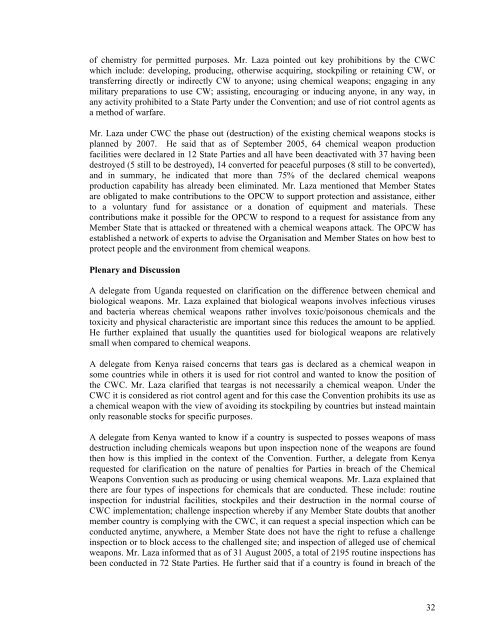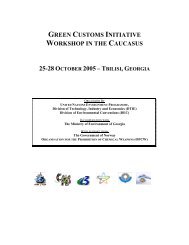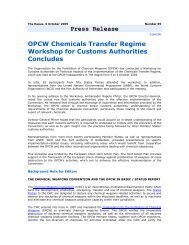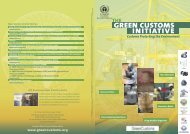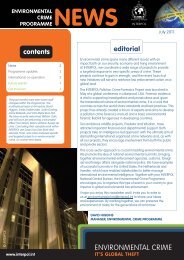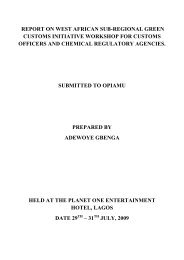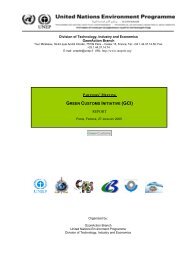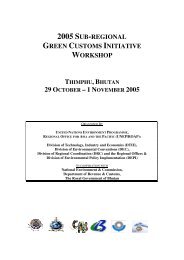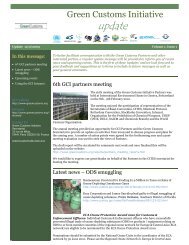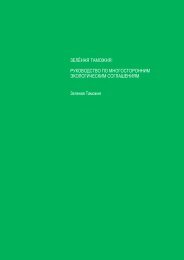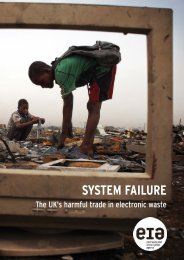Arusha - Green Customs Initiative
Arusha - Green Customs Initiative
Arusha - Green Customs Initiative
Create successful ePaper yourself
Turn your PDF publications into a flip-book with our unique Google optimized e-Paper software.
of chemistry for permitted purposes. Mr. Laza pointed out key prohibitions by the CWC<br />
which include: developing, producing, otherwise acquiring, stockpiling or retaining CW, or<br />
transferring directly or indirectly CW to anyone; using chemical weapons; engaging in any<br />
military preparations to use CW; assisting, encouraging or inducing anyone, in any way, in<br />
any activity prohibited to a State Party under the Convention; and use of riot control agents as<br />
a method of warfare.<br />
Mr. Laza under CWC the phase out (destruction) of the existing chemical weapons stocks is<br />
planned by 2007. He said that as of September 2005, 64 chemical weapon production<br />
facilities were declared in 12 State Parties and all have been deactivated with 37 having been<br />
destroyed (5 still to be destroyed), 14 converted for peaceful purposes (8 still to be converted),<br />
and in summary, he indicated that more than 75% of the declared chemical weapons<br />
production capability has already been eliminated. Mr. Laza mentioned that Member States<br />
are obligated to make contributions to the OPCW to support protection and assistance, either<br />
to a voluntary fund for assistance or a donation of equipment and materials. These<br />
contributions make it possible for the OPCW to respond to a request for assistance from any<br />
Member State that is attacked or threatened with a chemical weapons attack. The OPCW has<br />
established a network of experts to advise the Organisation and Member States on how best to<br />
protect people and the environment from chemical weapons.<br />
Plenary and Discussion<br />
A delegate from Uganda requested on clarification on the difference between chemical and<br />
biological weapons. Mr. Laza explained that biological weapons involves infectious viruses<br />
and bacteria whereas chemical weapons rather involves toxic/poisonous chemicals and the<br />
toxicity and physical characteristic are important since this reduces the amount to be applied.<br />
He further explained that usually the quantities used for biological weapons are relatively<br />
small when compared to chemical weapons.<br />
A delegate from Kenya raised concerns that tears gas is declared as a chemical weapon in<br />
some countries while in others it is used for riot control and wanted to know the position of<br />
the CWC. Mr. Laza clarified that teargas is not necessarily a chemical weapon. Under the<br />
CWC it is considered as riot control agent and for this case the Convention prohibits its use as<br />
a chemical weapon with the view of avoiding its stockpiling by countries but instead maintain<br />
only reasonable stocks for specific purposes.<br />
A delegate from Kenya wanted to know if a country is suspected to posses weapons of mass<br />
destruction including chemicals weapons but upon inspection none of the weapons are found<br />
then how is this implied in the context of the Convention. Further, a delegate from Kenya<br />
requested for clarification on the nature of penalties for Parties in breach of the Chemical<br />
Weapons Convention such as producing or using chemical weapons. Mr. Laza explained that<br />
there are four types of inspections for chemicals that are conducted. These include: routine<br />
inspection for industrial facilities, stockpiles and their destruction in the normal course of<br />
CWC implementation; challenge inspection whereby if any Member State doubts that another<br />
member country is complying with the CWC, it can request a special inspection which can be<br />
conducted anytime, anywhere, a Member State does not have the right to refuse a challenge<br />
inspection or to block access to the challenged site; and inspection of alleged use of chemical<br />
weapons. Mr. Laza informed that as of 31 August 2005, a total of 2195 routine inspections has<br />
been conducted in 72 State Parties. He further said that if a country is found in breach of the<br />
32


